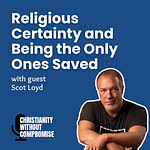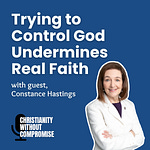I fell in love with the Bible because I saw it as extraordinarily revolutionary. It challenged so many beliefs and practices in the modern world. It was so counter-cultural, stepped on toes, made people mad, and it changed people.
It really changed people. It changed me.
And then I changed again.
Today’s topic is about a particular narrow way of approaching scripture that I believe has become an idol. We are talking about something that has become a bit of a litmus test of faith—and it shouldn’t. We are talking about creationism and literal interpretations of scripture. But more than that, we are talking about how to appropriately ask the Bible the right questions—questions that it is actually trying to answer.
I encountered a love of scripture in the second grade. I was told how it had answers to questions I never even thought to ask and presented hot takes on items I didn't think were controversial. Through books at my dad's Christian bookstore and speakers at lectureships I attended, I was empowered, emboldened, and enlightened in a new love of scripture.
It changed my life. It truly changed everything for me. So much of who I am today goes back to those early moments of learning about the Bible—learning about how it critiqued all the conventional wisdom and beliefs and sciences of the world.
My entire trajectory, my two degrees in biblical studies, my several books and academic articles, all of that stems from this spark that changed me forever.
It was a moment where I directed my nerdy side to one big topic: the Bible.
That love for scripture has never left. It’s still here. It’s actually more robust than ever as I’ve developed tools to appropriately handle the Bible through years of professional and personal training.
But—and here is the big but—I have changed my specific views. The positions I held most dear, guarded most closely, have largely been dropped. In many ways, the very foundation for my lifelong love has been completely abandoned. Because in truth, I originally fell in love with six-day creationism. That was the foundation of my faith. The idea that the Bible was completely literal.
I believed that all the top scientific minds of the day were completely loony, either stupid or deliberately lying in some kind of, I don’t know, elaborate plot with no clear end game. I believed that evolution and an old earth were incompatible with being a dedicated follower of Jesus.
Creationism was my foundation. I wrote articles, developed an anti-evolution superhero character, created a non-profit organization all about it, established and spoke at a conference on the subject, and appeared on podcasts and YouTube channels as the token young guy taking on the scientific establishment.
It became my life.
And then, I discovered the Bible again.
In retrospect, I was warned by mentors that the very conservative Christian school I was attending for college was some kind of secret liberal brainwashing machine. But it was better than a state school where professors were said to be literally evil and only taught with the purpose of crushing the faith of young people.
I came armed with all sorts of knowledge to refute alternative views of scripture—because God forbid other people have opinions. I knew all the common arguments. I had zingers loaded just for these moments.
But that first semester of freshman year, as a Bible major, I encountered a view I was never prepared for. And it was not spoken with malice. There was no need to convince me to take the view. It was presented gently, with grace, by someone who was really smart and really loved Jesus.
I was just asked to respect the Bible by treating it appropriately—by reading it in context.
Which is what I always wanted to do! But I was unintentionally adding my own modern presuppositions into the text. I didn't realize this at the time, but I had constructed a binary: either the text is like a video recording snapshot of reality, or it's some kind of analogy or metaphor for something else, the opposite of literal, it;s all fake and mythological.
Those were the two choices that I thought everybody had to make when reading the Bible.
I knew the arguments to say Genesis 1 isn’t an analogy, arguing against an idea that each creation day was secretly a couple million years old or whatever.
I knew the ways to explain how the “everything is just a metaphor” crowd was wrong. So in my mind, it had to be the literal option. It HAD TO BE.
Yet I was introduced to a different way of thinking—the same way most people thought about text for centuries before the Scientific Revolution. In ancient times, truth had a different standard. Especially when you go as far back as Genesis. Ancient people told accounts for the purpose of making some kind of point.
They explained how things are the way they are, or why people did specific kinds of things. There wasn’t indoor plumbing or modern amenities. Most people didn’t have time to just sit down and record history for fun. There was a specific message they had to get across if they were communicating in writing.
I learned that notions of history and facts as we know them are only about 500 years old—Renaissance and Enlightenment stuff.
Christian philosopher Alasdair MacIntyre even writes tongue-in-cheek that;
“Facts, like telescopes and wigs for gentlemen, were a 17th-century invention.”
-Alasdair MacIntyre, Whose Justice? Which Rationality?
Before that time, there wasn’t quite the same definition of truth. Something could be true without having factually happened in the way we think of it today. That doesn't mean people just made stuff up—but every story had a point. That point came before strict historical accuracy.
So when it comes to the Bible, we need to play by its rules, not just make up our own.
Even though God is a God of all time, it’s very presumptuous to assume that everything in the Bible is written according to 21st-century standards. No, the Bible was written in a particular time, language, and place—God works through history by being relatable in the moment.
Jesus shows us that reality. Jesus, our best representation of God, was self-limited by time and culture. He talked about fishing and agriculture, not iPhones or the Super Bowl or 401(k)s. He used things people understood at that time.
When God communicates in Scripture, God communicates in the language of the people. To understand Jesus—and all of Scripture—we need to know something about the time in which the teachings occurred and the writing was written down.
We must understand how the original people best understood it. Like, if I go to an undiscovered tribe in the Amazon, I can’t yell at them for not speaking English! No, I have to meet them on their terms. The Bible is like that.
I need to be aware of my expectations and assumptions and instead read in its ancient context. I must inhabit the world of the text.
This was a major shift in my life.
I began to see the Bible in a new way. It’s still mysterious, numinous, holy. It’s still communication from God. But God gave us intellect to probe into the intricacies of that communication.
And God didn’t give us a science or history book, though both are certainly present in parts of Scripture. God gave us a story—a story that we are invited into. We step in, explore, and come back changed.
The Bible is still the same revolutionary book I always believed it was. But instead of it being all about challenging the scientific establishment—that’s not why we have it—it challenges the idols we have placed on pedestals in our hearts.
And what do we do with idols on this Substack? Oh yeah, we smash them.
My alma mater, at the time I was a student, was pretty good about showing each side. We had an intelligent design guy come, a specialist in philosophy of science. And we had Hebrew Bible scholars come, who told us that asking Genesis the question “What happened at the beginning of the world” is a question that Genesis isn’t even trying to address—it’s like me asking Shaquille O’Neal about playing hockey—it makes no sense.
At the time, though, I was still on team creationism. I ended up emailing a Hebrew Bible scholar hoping he could come and balance us out with a scholarly perspective on why Genesis meant that a six-day creation was exactly what happened in history.
But unfortunately, the professor told me he was getting up there in years and no longer traveled. I asked him for a recommendation for someone else…
…and he said he didn’t know ANY other experts on the Old Testament who also believed in a six-day creation.
Yup. All of his colleagues had determined that wasn’t a question that could be fairly asked of the text.
The only person he could recommend was a former chemist. A famous creationist whose credentials were in chemistry, not in Hebrew and the Ancient Near East and the Old Testament. I am not in the habit of going with the majority opinion, but it should still be taken into account here!
This should tell us something.
The people who know the world of the text the best continuously realize that to be fair to the time period meant not asking what happened but what principle or argument it was trying to get across.
I didn’t change my mind overnight. It took years. I don't expect anyone to be changed by one blog post either!
So, for further resources on a view of Genesis informed by understanding the ancient world and how they wrote, I recommend Old Testament scholar and Ancient Near East expert Dr. John Walton. He has a plethora of helpful Lost World books, but you can also check out Spencer Shaw’s podcast Thinking Theologically, where he interviewed Dr. Walton. Spencer is a former guest of this show and has the Smashing Idols stamp of approval.
For more about encountering the Bible in a new way, I recommend New Testament scholar Dr. Scot McKnight’s book The Blue Parakeet. Scot is also a former guest of the show. The Blue Parakeet isn’t a last word on the subject, but it’s the best book I’ve read on wrestling with and interpreting the Bible that’s approachable to people without a Biblical scholarship background. You can also listen back to Scot’s episode on this show where we talk about deconstruction. Though not touched on in the episode, creationism is mentioned in his book Invisible Jesus as one thing many Christians have deconstructed from. Many of these Christians have found a healthier view of Scripture that keeps them in love with Jesus.
I want to invite us to view the Bible on its own terms.
It’s definitely an idol to wield the Bible as a weapon, to distrust every expert and authority around us. Scripture is profitable for our faith, but that doesn’t mean it has indisputable opinions on history, science, psychology, or all that stuff. It was still written in a time and place, though the things that actually matter in it are timeless truths.
To be honest, I haven’t looked much into the scientific evidence for evolution. I just know it’s the scientific consensus and what I learned in AP Biology. That’s because my changing view has 0% to do with science and 100% to do with a more respectable approach to Scripture. I don’t think Scripture has an opinion on the age of the earth, the exact mechanics of origins, or if humans lived with dinosaurs. That’s not what the Bible is about.
The Bible isn’t about answering our modern questions about origins or geology. It’s about questions like:
Who is our Creator?
What is the role of humanity?
How should humans relate to God and each other?
How do we get out of this mess?
What is promised for our future?
Those are the questions Scripture answers. To suggest it wants to comment on origins and all the nitty gritty details (as we define truth nowadays) is like asking your IKEA coffee table instruction manual about how to repair a NASA rocket ship.
But to be crystal clear: I don’t care if you are a creationist or not, though I’ve established I don’t think it makes sense to draw creationist conclusions from Scripture.
If you take away anything from this, really, I just want you to be aware of the kind of matters Scripture speaks on and the matters it doesn’t. Respect God by digging truth from the Bible that it actually wants to communicate, and not getting caught up in modernist movements that twist it to make claims that it never was commenting on.
Please respect Scripture on it’s own terms, and not what we modern folk want it to be commenting on. It’s Bible abuse to do otherwise.
I love the Bible because I see it as extraordinarily revolutionary. It challenges so many beliefs and practices in the modern world. It is so counter-cultural, steps on toes, makes people mad. And it changes people.
It really changes people. It changes me.
Important Links
The Lost World book series by Dr. John Walton (most relevant to our discussion)
The Lost World of Adam and Eve: Genesis 2-3 and the Human Origins Debate
The Lost World of Genesis One: Ancient Cosmology and the Origins Debate
The Lost World of Scripture: Ancient Literary Culture and Biblical Authority
The Lost World of the Flood: Mythology, Theology, and the Deluge Debate
New Explorations in the Lost World of Genesis: Advances in the Origins Debate
“Conversation | Dr. John Walton – Genesis 1 and the Origins Debate” - Thinking Theologically
The Blue Parakeet: Rethinking How You Read the Bible - Dr. Scot McKnight
SEE ALSO:
Can the Bible be an Idol? - Andrew Fouts
In this conversation on the Smashing Idols Podcast, host Jake Doberenz interviews podcaster and writer Andrew Fouts about whether or not the Bible can become an idol, discussing how scripture can be misused and misunderstood. The discussion emphasizes the importance of viewing the Bible as a tool for understanding God and living out one’s faith, rather …
We Should Read the Bible - Joe Dea
In this conversation on the Smashing Idols Podcast, host Jake Doberenz interviews podcaster and teacher Joe Dea on the transformative nature of the Bible, discussing how many people inappropriately engage in Scripture or don’t want to engage with it at all. Joe shares his personal journey of overcoming initial hesitations to embrace scripture and goes o…
Follow this show and Jake Doberenz’s writings at jakedoberenz.substack.com.
Smashing Idols is a part of the KFM Broadcasting network.


















Share this post